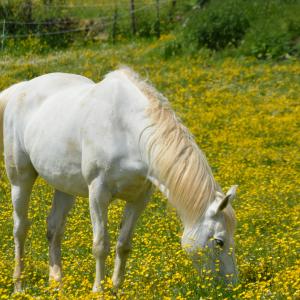
By Vet Bethan Harper

The warmer weather and occasional blue skies of summer are a welcome change for horse owners after the muddy fields, and soggy boots of winter.
Unfortunately, with these changes comes a new roster of health concerns for your equine companion. Below are some of the common summer health issues we encounter, and how you can combat them.
Sunburn - horses are just as susceptible to sunburn as humans, or any other animal! Pink skin and white markings are more susceptible to burning, so extra care should be taken with these horses. The use of a horse friendly suncream over sensitive areas like muzzles can help, along with using fly rugs and masks with a UV filter.
Dehydration - horses can easily become dehydrated due to increased sweating in warmer weather, particularly if they are being exercised. Signs of dehydration include reduced urination, dark urine, shallow breathing, and a dull demeanour. Taking a pinch of skin to see how long it takes to return to normal is a quick way to estimate hydration. In a healthy horse this should happen almost immediately. To prevent dehydration, it is important to ensure that your horse has a constant supply of fresh drinking water. For fussy horses that don’t drink lots, you can try adding flavourings to their water, or increasing their fluid intake through soaked hay or mash feeds. If you are concerned that your horse may have dehydration, always call your vet.
Heat Stress - horses generally cope well with summer heat but rising temperatures and over-exertion can lead to heat stress, a very serious condition. Horses will often be dehydrated and show additional signs of panting, flared nostrils, muscle tremors, decreased appetite, increased rectal temperature, and excess sweating. If you suspect your horse is suffering from a heat related illness it is essential to call your vet immediately, as this can progress rapidly and become fatal if not treated promptly. In the meantime make sure to move them into the shade, offer plenty of water, and pour cool (not ice cold) water over their back and allow it to air dry without scraping. To reduce the risk of heat stroke, avoid exercising your horse during the hottest parts of the day. Stick to early mornings or evenings, and consider not exercising them at all if it is particularly hot. Make sure they have plenty of water, and a place to rest in the shade if they choose.
Summer Asthma - horses can develop allergies to plants and pollen found in their summer pasture and show signs of asthma that aren’t present during the winter months. However, it is also common for horses to have multiple allergies, so you may have an asthmatic horse that shows signs both in the stable and the pasture. Signs of asthma include increased respiratory rate and effort, a wheezy cough, nasal discharge, and exercise intolerance. Veterinary treatment is often required, but it is important to reduce exposure to allergens as much as possible. This will depend on the trigger, but could include removing dust and ensuring adequate ventilation in the stable, soaking hay, and using low-dust bedding. For pasture specific allergies it may be a case of reducing turnout, or avoiding high pollen times.
Flies - flies and other biting insects are more likely to bother your horse during the summer months. Flies can cause local irritation and infection, and of course midges can cause severe itchiness in horses with sweet itch. To prevent flies and midges from biting your horse, a good fly rug and mask combination along with fly repellent is essential. Management strategies such as avoiding turnout at times flies are most active, regularly removing droppings from the environment, and situating the muck-heap away from the paddocks/stables can also help to reduce fly related problems.